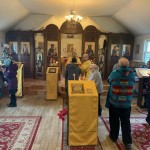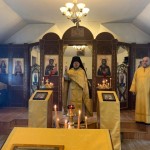On February 5, on the Sunday of Publican and Pharisee, feast of the Synaxis of the New Martyrs and Confessors of the Russian Church, our St. George parish family had a nice celebration. In the absence of our Rector, the Divine Liturgy was served by Abbot Eutychius (Dovganyuk).
After the Gospel lesson Fr. Eutychius preached a short sermon in Russian. Then by the blessing of the Rector, our Cantor, Olga Russanow read the following homily prepared by him:
“Dear brothers and sisters in Christ! In today’s reading from the Gospel our Lord tells us that two men went up to the Temple to pray. One of them, who was a public sinner, went home justified. Yet another who was viewed as a just man was condemned. Why? Simply because of their attitudes: the publican has the right attitude. He is asking God for mercy in repentance for his sins of which he is conscious. On the other hand, the Pharisee has the wrong attitude. He is not asking for mercy. On the contrary, he is satisfied with himself. He is under the illusion of being righteous. And he has this illusion merely because he fulfills all the outward observances of the Jewish Law. His piety is all for show, it is all outward and does not come from the heart. We may say that the Pharisee does the right things, but he does them for all the wrong reasons, and thus they lose all their force”.
“The error of the Pharisee is to confuse the means with the ends. Our end, or goal, is to find salvation. There are many means to salvation, to preparing our souls to be with God. However, we should not think that the means to salvation automatically bring salvation, merely because they are outwardly observed. In order to understand this, we first need to know what the means to salvation are”.
“First of all, we have to worship God and pray to Him. True, we can worship and pray to God everywhere, but there is one place where we can be particularly close to Him, and where it is easier to speak to Him in prayer, and that is at church. Only at church are services held in His honor and we can thank Him, worship Him and pray to Him more easily during those services and only at church can we partake of the Sacraments”.
“Secondly, we can deepen our worship of God through reading and obeying His Word, through fasting and through almsgiving”.
“Just as worship, prayer, reading of the Word of God and almsgiving are only means to salvation, and not salvation itself, so fasting too is only a means to drawing closer to God. It is an experience of the spiritual people that fasting helps us to reach certain spiritual state to be closer to our goal of salvation. ‘We are what we eat’, said the philosopher. It makes sense not only for our body, but for our soul. But fasting is not a goal by itself. The Church therefore does not ask us to fast twelve months of the year. It asks us through Great Lent, the three other Fasts, and Wednesdays and Fridays, to fast for six months of the year. The Church’s approach is balanced. That is why this coming week, there is no fast – to remind us that although salvation is not in fasting, on the other hand, it is also true that fasting for Christ’s sake will help us draw closer to salvation”.
“We are what we eat”, said the philosopher. We can see this especially clearly in holy Communion. If we come to Communion frequently, we are with Christ and He is with us. But if on the other hand, we never come to Communion, then we shall never be with Christ and He will never be with us: “We are what we eat””.
“We may come to a conclusion that if we sincerely, from our hearts, worship and pray to God, read His words, fast and give alms, then we are not behaving as the Pharisee, but as the publican, we are asking for mercy, and thus we find justification. Not justification because of our outward actions, but justification through the Mercy of God, which alone makes our salvation possible. In doing all these things, we are actually saying the Prayer of the Publican, which is at the root of the Jesus Prayer: “God, be merciful to me a sinner”. For it is only the Mercy of God, given as a gift to us for our sincerity, which brings us into His presence, bringing us salvation, for our God is merciful and He loves mankind”.
After the dismissal of the Liturgy Fr. Eutychius served the memorial Litia in commemoration of all the deceased who suffered during the time of godless persecutions.




